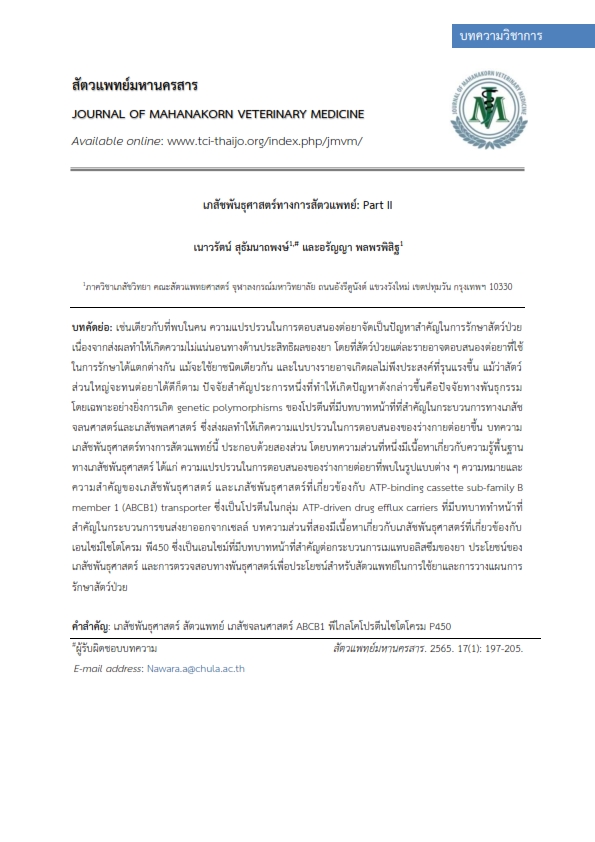Pharmacogenetics in Veterinary Medicine: Part II
Main Article Content
Abstract
Similar to human being, animal patients vary widely in their responses to medications. Variation in drug response often causes problems in the treatment since it can result in unpredictable and variability of therapeutic efficacy and sometimes serious adverse drug reactions. One of the key factors that contributed to variation in drug responses is the genetic factors, especially genetic polymorphism of the proteins that play an important role in pharmacokinetics and pharmacodynamics. The aim of this article is to provide useful information on veterinary pharmacogenetics. In part I of the series we focused on the basic knowledge in pharmacogenetics, the different forms of variation in drug responses, and the pharmacogenetics of ABCB1 which is a member of ATP-driven drug efflux carriers. In part II of the series, we focused on the cytochrome P450 enzymes which play an important role in pharmacokinetics of drugs commonly used in veterinary medicine and the application of genetic testing in veterinary clinical practice.
Article Details

This work is licensed under a Creative Commons Attribution-NonCommercial-NoDerivatives 4.0 International License.
References
Court, M. H. 1999. Anesthesia of the sighthound. Clin. Tech. Small Anim. Pract. 14(1):38-43.
Court, M. H. 2013. Canine cytochrome P-450 pharmacogenetics. Vet. Clin. North Am. Small Anim. Pract. 43(5):1027-1038.
Martinez, S. E., J. Shi, H. J. Zhu, T. E. Perez Jimenez, Z. Zhu, and M. H. Court. 2019. Absolute quantitation of drug-metabolizing cytochrome p450 enzymes and accessory proteins in dog liver microsomes using label-free standard-free analysis reveals interbreed variability. Drug Metab. Dispos. 47:1314-1324.
Martinez, S. E., M. C. Andresen, Z. Zhu, I. Papageorgiou, and M. H. Court. 2020. Pharmacogenomics of poor drug metabolism in Greyhounds: Cytochrome P450 (CYP) 2B11 genetic variation, breed distribution, and functional characterization. Sci. Rep. 10:69-82.
Martinez, M., S. Modric, M. Sharkey, L. Troutman, L. Walker, and K. Mealey. 2008. The pharmacogenomics of P-glycoprotein and its role in veterinary medicine. J. Vet. Pharmacol. Ther. 31:285-300.
Mealey, K. L., J. Fidel, J. M. Gay, J. A. Impellizeri, C. A. Clifford, and P. J. Bergman. 2008. ABCB1-1Delta polymorphism can predict hematologic toxicity in dogs treated with vincristine. J Vet. Intern. Med. 22:996-1000.
Mealey, K. L., S. A. Bentjen, Gay, J. A., and G. H. Cantor. 2001. Ivermectin sensitivity in collies is associated with a deletion mutation of the mdr1 gene. Pharmacogenetics. 11(8):727-733.
Mealey, K. L. and K. M. Meurs. 2008. Breed distribution of the ABCB1-1Delta (multidrug sensitivity) polymorphism among dogs undergoing ABCB1 genotyping. J. Am. Vet. Med. Assoc. 233:921-924.
Mealey, K. L., S. E. Martinez, N. F. Villarino, and M. H. Court. 2019. Personalized medicine: going to the dogs? Hum Genet. 138(5):467-481.
Mealey, K. L., S. Greene, R. Bagley, J. Gay, R. Tucker, P. Gavin, K. Schmidt, and F. Nelson. 2008. P-glycoprotein contributes to the blood-brain, but not blood-cerebrospinal fluid, barrier in a spontaneous canine p-glycoprotein knockout model. Drug Metab. Dispos. 36(6):1073-1079.
Navapour, L., and N. Mogharrab. 2021. In silico screening and analysis of nonsynonymous SNPs in human CYP1A2 to assess possible associations with pathogenicity and cancer susceptibility. Sci. Rep. 11:4977-4991.
Pashazadeh, P., M. Abdoljalal, A. Jahanbakhash, and K. Masoud. 2019. Thiopurine methyltransferase genetic polymorphisms and activity and metabolic products of azathioprine in patients with inflammatory bowel disease. Endocr. Metab. Immune. Disord. Drug. Targets. 19(4):541-547.
Paulson, S. K., L. Engel, B. Reitz, S. Bolten, E. G. Burton, T. J. Maziasz, B. Yan, and G. L. Schoenhard. 1999. Evidence for polymorphism in the canine metabolism of the cyclooxygenase 2 inhibitor, celecoxib. Drug Metab. Dispos. 27:1133-1142.
Steffey, E. P. and D. Howland. 1977. Isoflurane potency in the dog and cat. Am. J. Vet. Res. 38:1833-1836.
Tanaka, N., R. Shinkyo, T. Sakaki, M. Kasamastu, S. Imaoka, Y. Funae, and H. Yokota. 2005. Cytochrome P450 2E polymorphism in feline liver. Biochim. Biophys. Acta. 1726(2):194-205.
Viviano, K. R. 2019. Pharmacotherapeutics of immune-mediated disease. In: K. L. Mealey, editor, Pharmacotherapy for veterinary dispensing. John Wiley & Sons, Inc., New York. p. 339-360.
Wang, B., and S. F. Zhou. 2009. Synthetic and natural compounds that interact with human cytochrome P450 1A2 and implications in drug development. Curr. Med. Chem. 16(31):4066-4218.
Whiterock, V. J., T. A. Delmonte, L. E. Hui, T. L. Orcutt, and M. W. Sinz. 2007. Frequency of CYP1A2 polymorphism in beagle dogs. Drug Metab. Lett. 1:163-165.
Veterinary Clinical Pharmacology Laboratory. College of Veterinary Medicine. Washington State University. 2021 (cited 10 November 2021). Affected Breeds. Available from: https://vcpl.vetmed.wsu.edu/affected-breeds


